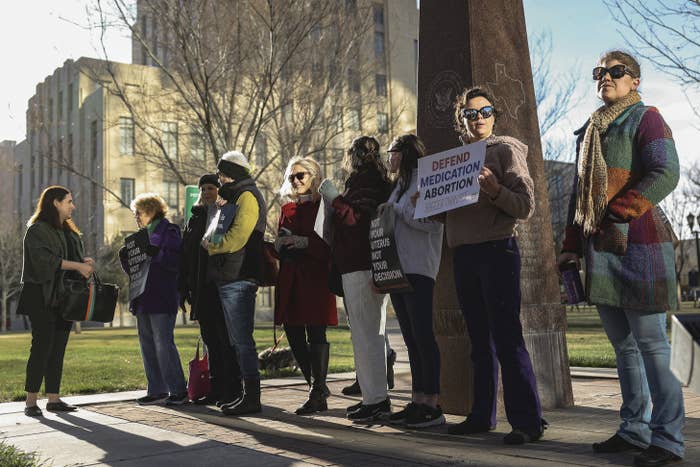
A federal judge in Texas on Friday suspended the FDA’s approval of mifepristone, a drug used in medication abortion, potentially making it inaccessible nationwide.
In his ruling, US District Judge Matthew Kacsmaryk said regulators had failed to consider "the psychological effects of the drug or an evaluation of the long-term medical consequences of the drug,” but put his decision on hold for seven days to give the Biden administration a chance to appeal. Meanwhile, a federal judge in Washington state issued what appeared to be a competing ruling prohibiting the FDA from pulling the drug — which was approved more than two decades ago — off the market. But that ruling only applies to the 18 plaintiff states in that case, including Washington, Oregon, Arizona, Colorado, New Mexico, and Vermont.
It wasn’t immediately clear what the dueling opinions will mean for access to medication abortion nationwide.
Anthony Michael Kreis, a professor at Georgia State University College of Law, told BuzzFeed News that the conflict “almost guarantees that the Supreme Court will have to step in immediately.”
“What will be key to watch is whether the Court will step in to block the Texas injunction against the FDA, or if the Court will attempt to simultaneously resolve both cases on an expedited basis,” he said. “The competing rulings will cause considerable disruption and confusion without near-immediate intervention by the justices.”
Steve Vladeck, a professor at the University of Texas School of Law and an expert on federal courts, said on Twitter that even though the Washington ruling technically only applies to the plaintiff states "there would be no way for the FDA to comply with both *if* Kacsmaryk’s ruling ever goes into effect."
"This all-but guarantees that Mifepristone gets to #SCOTUS in a hurry," Vladeck tweeted.

The federal ruling in Texas stems from a case brought by the Alliance for Hippocratic Medicine, an anti-abortion group, that aimed to force the Federal Drug Administration to withdraw its approval of the drug via emergency order. Mifepristone is currently used, along with misoprostol, as part of the most common two-drug regimen for medication abortions.
The case marks the latest right-wing endeavor to chip away at abortion access across the United States. Since the Supreme Court struck down Roe v. Wade in June 2022, mifepristone — also known as the “abortion pill” — has become more vital than ever, especially in states that have banned or seriously restricted abortion. Of the hundreds of thousands of abortions performed every year nationwide, more than half are done via medication, according to a 2022 survey from the Guttmacher Institute.
Kries said the Supreme Court should act quickly in favor of maintaining the status quo while the competing injunctions are sorted out.
“Any disruption in the availability to mifepristone caused by the court would be an extraordinary departure from ordinary standards,” he added.
Medication abortion is usually carried out by ingesting two pills: mifepristone, which blocks the hormone progesterone, and misoprostol, which induces the expulsion of pregnancy tissue from the uterus. The drugs, which must be prescribed by a healthcare provider, may be used for abortions until up to 10 weeks’ gestation. First authorized in France in 1988, mifepristone was approved for use in the US in 2000 after a four-year vetting process.
In a Friday evening statement, Attorney General Merrick Garland said the Department of Justice “strongly disagrees” with the Texas ruling, and would appeal it. “Today’s decision overturns the FDA’s expert judgment, rendered over two decades ago, that mifepristone is safe and effective. The Department will continue to defend the FDA’s decision,” he said. “The Department is committed to protecting Americans’ access to legal reproductive care.” Garland also said the DOJ would review the competing ruling in Washington state.
Kacsmaryk, who was appointed as a judge in 2019 by then-president Donald Trump, has a long history of staunchly conservative beliefs and rulings. Last year, he ruled that minors in Texas could not access birth control without a parent’s permission.
He has also expressed significant and repeated opposition to the rights of LGBTQ Americans. In a 2015 journal article, he criticized federal protections for LGBTQ individuals, arguing that instituting these laws would “give no quarter to Americans who continue to believe and seek to exercise their millennia-old religious belief that marriage and sexual relations are reserved to the union of one man and one woman.” In a 2016 media article, he slammed a school district for allowing a trans student to use the bathroom matching their gender identity, and also served as the defense attorney for the owners of an Oregon bakery who had refused to bake a wedding cake for a same-sex couple.
Knowing the abortion pill case was likely to spark public outrage, Kacsmaryk took extraordinary measures to keep proceedings under wraps: Typically, details on federal court cases are released on a publicly available docket. But in a conference call with lawyers on March 10, Kacsmaryk said he would try to delay the hearing’s announcement until the night before. However, the Washington Post learned of the call a day later, giving the public warning of the upcoming hearing.
During the hearing on March 15, according to the Washington Post, Kacsmaryk appeared open to the anti-abortion group’s claims that mifepristone could be harmful or even deadly, and that the FDA approval process had been rushed.
"How many more women have to die?” the anti-abortion group’s attorney, Erik Baptist, asked during the hearing, according to the Lubbock Avalanche-Journal.
In reality, scientific evidence categorically demonstrates that mifepristone is safe. As of 2018, FDA data shows, 24 people out of 3.7 million have died after taking mifepristone, though their deaths could not be conclusively tied to the drug. Department of Justice attorneys, who defended the FDA, said 99.9% of mifepristone users show no major side effects.
Ordering a ban on an FDA-approved drug — particularly one so widely used for over 20 years — would be an unprecedented decision. Acknowledging this, Kacsmaryk asked Baptist if he was aware of any other rulings that have taken a drug off the market, according to the Associated Press. There were none, Baptist said, but he contended that this was due to the FDA “stonewalling” previous challenges to the drug.
In a “normal world,” Lorie Chaiten, senior staff attorney at the American Civil Liberties Union's Reproductive Freedom Project, told BuzzFeed News ahead of the March 15 hearing, the anti-abortion group’s lawsuit would have been thrown out from the get-go. The fact that it wasn’t shows we’ve entered “uncharted waters,” she said.
“What the plaintiffs have asked for here is unprecedented,” Chaiten said. “Courts just simply do not jump in and remove drugs from the market, particularly not ones that have been on the market for [23 years].”
Ahead of the arguments in the Texas case, Democratic-led states sued the FDA in late February in the US District Court for the Eastern District of Washington. The complaint primarily asked the court to order the agency to remove an extra layer of restrictions on mifepristone. But it also sought a ruling enjoining the agency "from taking any action to remove mifepristone from the market or reduce its availability." On Friday, District Judge Thomas Owen Rice, an appointee of Barack Obama, did just that, finding that a preliminary injunction was in the public interest.
Still, Rice wrote that a nationwide injunction in this case was "inappropriate," citing the competing litigation in Texas.
While it remains unclear how the Supreme Court will sort out the differences in the two opinions, the impact of Kacsmaryk’s ruling stands to be felt nationwide — if it is allowed to take effect.
“Even in states where abortion is legal, if it’s an unapproved drug, there could be legal repercussions for continuing to prescribe it and certainly for these sponsors to continue to distribute it,” Chaiten said.
David Mack and Stephanie K. Baer contributed reporting to this story.
Correction: Seventeen states and the District of Columbia are suing the FDA to remove restrictions on access to mifepristone. The number of plaintiffs was misstated in a previous version of this story.
